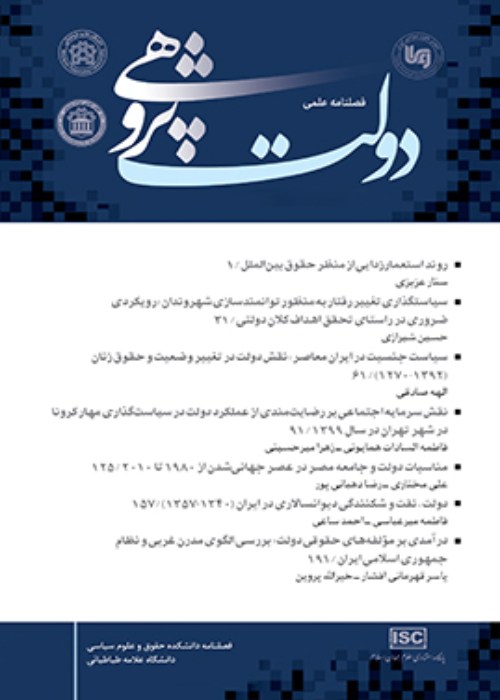An Analysis on Failed State in Libya
Author(s):
Abstract:
Purpose
The aim of the present paper is to examin the features and characteristics of a failed state with emphasis on the failed state in Libya. The paper seeks to answer the following questions: "Under what conditions does a state end in failure? And what are the criteria of a failed state?" With regard to the situation in Libya after Gaddafi and the Libyan scene involved in multiple matters, the country can be regarded as a failed state.With the beginning of the Islamic awakening in Tunisia, crisis-prone countries such as Libya faced the awakening of the Muslims. In Libya, after 9 months of conflict between Gaddafi forces and the revolutionaries, the anti-government forces finally gained victory in August of 2011. Following the victory of the Libyan revolutionaries, a new stage began in the socio-political life of the country.
At first, it seemed that the process of nation-state building in the country would be taken slowly and with slight ups and downs. However, despite such hope and earlier efforts, after the collapse of the Gaddafi government, not only a powerful state did not take the stage in Libya, two governments, two parliaments, two prime ministers and two ministers entered the scence. During these years, Libya has been torn in fighting between two groups, one of which claimed that they are the genuine revolutionary forces and the other claimed that they have been trying to restore the country to the path of revolution.
In the true sense of the word, there is still no government in Libya, and the governments established after the revolution in this country have inherited the inefficiency of Gaddafi's failed state, and are now proceeding along the path of state failure. Considering the situation in post-Gaddafi Libya and many other factors, this country could be regarded as a failed state. Libya is now a country with a government so weak that is unable to provide even its own security.
Design/Methodology/Approach: This paper is formed and based on the failed states theory, using the destructive method for exploring failed state indexes in order to examine the failed state in Libya in the post-Gaddafi era.
Findings: The new achievement of this paper lies within the situation that when there is no ability to perform functions such as security, welfare, civil society, democracy and legitimacy, the government is in a state of bankruptcy and one is faced with a phenomenon known as a failed state. The situation in Libya is an example of such a state. Tribal tendencies, regionalism, weakness of state institutions, and insufficiencies in various areas such as proper military structure, consensus among the elites and the state, democratic culture and civil society, elites, religious scholars and leaders, control over lands, infrastructure for economic, and foreign intervention are all signs of a failed state in the country.
Originality/Value: The failed state is a political body that has disintegrated to a point where basic conditions and responsibilities of a sovereign government no longer function properly. Loss of control, instability, inability to provide public services and interact with other states are the main characteristics of a failed state which is the case of Libya.
Keywords:
Language:
Persian
Published:
Studies the State, Volume:2 Issue: 6, 2016
Pages:
61 to 96
magiran.com/p1591114
دانلود و مطالعه متن این مقاله با یکی از روشهای زیر امکان پذیر است:
اشتراک شخصی
با عضویت و پرداخت آنلاین حق اشتراک یکساله به مبلغ 1,390,000ريال میتوانید 70 عنوان مطلب دانلود کنید!
اشتراک سازمانی
به کتابخانه دانشگاه یا محل کار خود پیشنهاد کنید تا اشتراک سازمانی این پایگاه را برای دسترسی نامحدود همه کاربران به متن مطالب تهیه نمایند!
توجه!
- حق عضویت دریافتی صرف حمایت از نشریات عضو و نگهداری، تکمیل و توسعه مگیران میشود.
- پرداخت حق اشتراک و دانلود مقالات اجازه بازنشر آن در سایر رسانههای چاپی و دیجیتال را به کاربر نمیدهد.
In order to view content subscription is required
Personal subscription
Subscribe magiran.com for 70 € euros via PayPal and download 70 articles during a year.
Organization subscription
Please contact us to subscribe your university or library for unlimited access!


